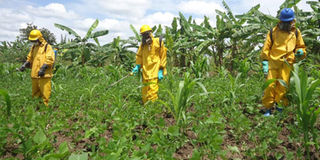Here comes the pest busters: Luweero youth group introduces spraying services

Above, Wabutungulu group spray pesticides in a garden of banana, maize and beans. Left, the various activities that they carry out, and below, a member shows how they dispose of the empty containers. PHOTOs BY FRED MUZAALE
What you need to know:
When we get paid, we save 20 per cent of the money and share the rest among group members
They rose to the occasion when they formed a group that will provide vital services that farmers need. Vincent Egesa told Fred Muzaale their story.
My name is Vincent Egesa, the team leader of Wabutungulu Spray Services, a youth group that is based in Wabutungulu village, Zirobwe Sub-county, Luweero District.
Our group currently has a membership of seven, all of them residents of the village.
We offer agricultural services such as spraying crops to kill pesticides or diseases, spraying herbicides to kill weeds, pruning of plants, fumigation of produce stores, and fertiliser application.
Alongside this, we also offer specialised agricultural services to absentee farmers or “Nokia farmers” as they are referred to, by preparing land, planting, weeding, pest control and even harvesting the produce for them.
Before we started doing this, all of us were carrying out subsistence farming by growing food crops while cultivating coffee as a cash crop to earn a living. This was after we dropped out of school at different levels but not beyond S4.
How we started
In 2011, Usaid through the Lead project came to Luweero District. The project’s main objective was to boost agricultural productivity among farmers to fight poverty in households.
However, the project leaders realised that there was no way agricultural productivity could be boosted when farmers were not making much effort to kill pests or diseases.
More so, the farmers lacked the knowledge on how to apply fertilisers, herbicides and pesticides. Even then, many of the farmers could not afford to spray their crops with herbicides to kill weeds. Though it is a cheaper and time-saving method compared to hoeing.
So the Lead project officials looked around for people who would offer such services to farmers but there was none, I quickly mobilised fellow youth and formed Wabutungulu Spraying Services, which we registered as a Community Based Organisation (CBO) at the district offices.
We were later trained by Lead project on how to apply and handle pesticides and other agro chemicals safely. They also took us to different agricultural shows and exhibitions, where we interacted with farmers and other people in agri-business and told them about our services.
After the training, we were told to buy protective gear that we were going to use in our work. Each pair of the gear was at Shs500,000, which we could not afford to raise. Lead project asked us to raise Shs100,000 for each pair and they topped up with the balance of Shs400, 000.
We get started with the work
Since we had interacted with farmers on several occasions during shows and exhibitions, getting clients was not very difficult. Also, farmers in our area got interested in our services and contacted us.
Although the clientele was small at first, the number grew with time when other farmers realised that we were offering good services.
Initially, we would get one or two customers in a fortnight. Now, the clientele has grown. We get at least two customers a week although the number shoots up during rainy season. Most of our customers are in Mukono, Nakasongola, Luweero and Nakaseke districts.
Currently, we are in partnership with Usaid’s Feed the Future Commodity Production and Marketing Activity (CPMA). Under this, we are linked to dealers in agro chemicals like MTK, Balton and others.

How we do our work
In most instances, customers come to our offices and tell us what kind of service they want from us. Although sometimes, some farmers call us and tell us what services they want.
We later visit the farm, where we are to carry out the work, to do a thorough examination of the work we are supposed to do. If need be, we give advise to our client before we embark on the work. For instance, a client might want us to apply NPK fertiliser but after studying the state of the crops and find out what type of nutrient they lack, we advise him to hire us to apply another type of fertiliser.
Future plans
Our future plans include expanding the membership to at least 15 because the clientele has grown, this will enable us to serve all our clients.
We also want to acquire more electric spraying pumps so that we can do the work easily and faster. However, this pumps costs Shs500,000 which is on the high side.
We also plan to grow our own crops so that we sell them as a way to diversify our income.
Then, we plan to stock agro-chemicals, which will enable us have them all the time and at a cheaper cost.
cost of services
The cost of our services depends on what type of work we are going to do and the location of the garden, where we are going to work from our office.
If it is far, we charge a higher fee because we incur a higher transport cost. For example, we charge between Shs1,500 and 2,000 when we spray herbicides to kill weeds.
But if it we are spraying pesticides to kill pests, we charge Shs2,000 for each 20-litre pump we spray.
This is because spraying herbicides is easier since we use a nozzle that does the work faster compared to the one we use when controlling pests.
For pruning, we charge Shs100,000 if it is thorough pruning (say, if the garden was abandoned for sometime).
But if it is ordinary pruning, we charge Shs30,000 for an acre.
For pest control, in case the pesticide is provided by the customer we charge Shs2, 000 for each 20-litre spray pump sprayed.
Fumigation charges for stores that are around our area depend on the tonnage of produce in the store.
We charge Shs12,000 for each tonne sprayed, say, if we are dealing with bean weevils. If say, a snake has entered a house, and the house is in near our office, we charge Shs2,000.
We still charge affordable fees for our services because we want our customers, mostly farmers, to make profits from their work.
In a month we can earn about Shs800,000 from our services.

Challenges
Our challenge now is to get more protective gear so that all members can protect themselves and also, we need to buy electronic spray pumps ,which are easy to use and at the same time do the work faster.
Another challenge is the ignorance of most farmers concerning which agro chemicals they use. On many occasions, they buy fake chemicals and want us to apply them on their crops, which we refuse to do.
When we do that, these farmers think we want to exploit them so they stop using our services.
During long droughts when there are hardly any farm activities taking place we do not have many customers. So, our income goes down.
Also, the cost of pesticides such as those against coffee twig borer is high. Many customers now request our services to control the pest in their coffee plantations.
Further, since most customers are farmers, they want to pay after selling their produce. But we need money to sustain our business, so it is difficult when we are not paid after providing the service.
serving “telephone farmers”
Recently, we introduced another service which we refer to as Nokia farmer service. In this case, we offer our services to absentee farmers on phone.
We offer this service to people who do farming yet they are too busy to the work by themselves.
In this case, the client calls us and tells us what he wants us to do for him/her. We do all the negotiations like the cost of the service on phone. In many cases, we do not meet the customers but communicate and get paid via phone. For this kind of client, we do the ploughing, planting, weeding and even harvesting for him/her. We get paid for each service offered, like when we finish planting, we get paid for that work and so on.
When we get paid, we save 20 per cent of the money and share the rest among group members.
It is the 20 per cent that we use to buy inputs we use like pesticides, herbicides and fertilisers.




